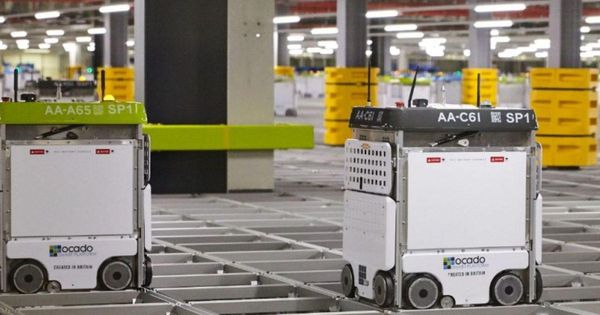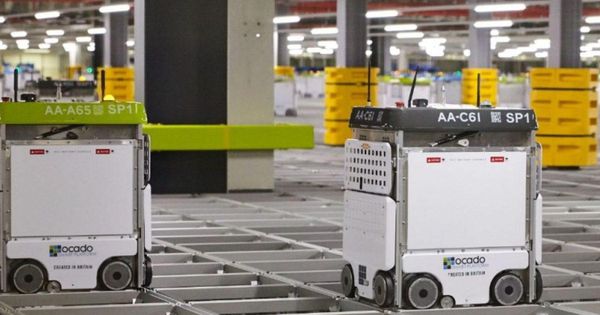
Ocado
Ocado’s home delivery platform is fulfilled by automated warehouse systems.
Retail-tech “mash-ups” are becoming one of 2018’s major themes in retailing, both in North America and Europe. So far this year, we have seen a flurry of tie-ups and acquisitions between long-standing retailers and tech firms or platforms. For example, Kroger sealed a deal with Ocado for the latter to build robotic fulfillment centers; Walmart announced it was buying a majority stake in Indian e-commerce marketplace Flipkart; and Carrefour announced a deal that will let Google Home users buy Carrefour groceries through the device. These moves bear out the prediction I made at the start of 2018 that more retailers would be forced to collaborate with tech companies this year in order to build digital capabilities and tap channels such as voice commerce.
The table below lists the major retail-tech partnerships and acquisitions we have seen in recent months, the large majority of which have been in the grocery space. This pattern reflects grocery retailers’ race to build out digital and fulfillment capabilities and, in some cases, preempt any challenges in the grocery category from Amazon.
Company reports
The U.S. and France: Racing to Win in Online Grocery
It is not only notable that most of these recent collaborations are focused on grocery, but also that American and French retailers dominate the list.
In the U.S., Walmart, Kroger and Target are racing to build share in a still-nascent online grocery market. For many years, these players left U.S. grocery e-commerce to languish, and online grocery penetration in the country remained well below the levels seen in some other Western markets. However, partnerships and acquisitions have flourished in the wake of Amazon’s acquisition of Whole Foods Market, announced in June 2017, suggesting that the threat posed by Amazon in grocery has prompted at least some of these new initiatives.
France is one of the most mature grocery e-commerce markets, but Carrefour and Groupe Casino have long held minority shares in the country’s online grocery market that belie their strongholds in store-based grocery. Two of their rivals, E.Leclerc and Auchan, dominate online grocery sales in France. Carrefour’s recent initiatives form part of its Carrefour 2022 strategy, which is designed to help the company carve out a 20% share in the online food e-commerce market by 2022.
The concentration of activity within the grocery sector also reflects the sector’s lagging status in e-commerce. Grocery is a follow-on category in terms of the development of e-commerce, where goods bought according to specification—such as electronics, books and music—lead the curve. Now, grocery retailers appear to be anticipating that food will follow those nonfood categories online, and they are investing in e-commerce operations accordingly.
US Census Bureau/Statista/Euromonitor International/Coresight Research
New Digital-First Approaches to High-Growth International Markets
The recent glut of retail-tech mash-ups represents not only a push to digitalize grocery operations, but also retailers’ new approaches to high-growth markets such as China and India. Walmart, for example, is retreating from brick-and-mortar ventures in markets such as Brazil and the U.K. while investing in Asian markets. This month, the company sold a majority stake in its Brazilian operations and, in late April, it announced that it plans to merge its Asda U.K. operation with rival Sainsbury’s and take only a minority stake in the new company. At the same time, Walmart is investing in China and India through acquisitions and partnerships with native digital platforms such as JD.com and Flipkart.
Expect Further Partnerships with Gatekeepers
I expect to see more collaborations in the months and years ahead. And I expect these to be sustained by certain tech firms’ status as gatekeepers that hold the keys to valuable channels or markets.
In new channels such as voice commerce, tech giants Amazon and Google control many of the devices and channels through which shoppers engage with retailers. That means that retailers wanting to offer shoppers the opportunity to buy through Amazon Echo or Google Home devices are forced into partnering with these tech firms, which may be competitors in other contexts.
The dominance of certain e-commerce platforms in high-growth markets such as India and China will continue to prompt Western retailers to collaborate with those firms in pursuit of growth in those markets. Expect firms such as Alibaba and JD.com in China and Flipkart, Snapdeal and Bigbasket in India to remain gatekeepers of the retail markets in those countries.

